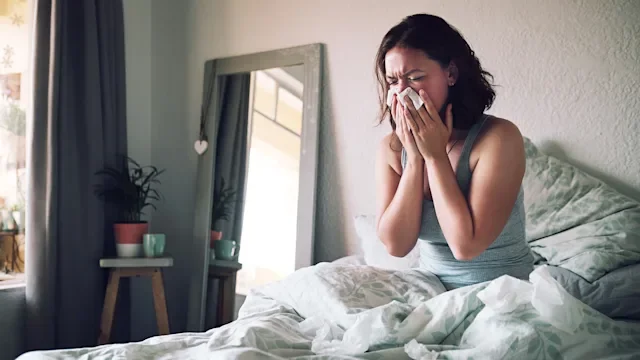Key takeaways:
Anti-Asian hate incidents, which have a long history in the U.S., have increased substantially during the COVID-19 pandemic.
According to GoodRx research, anti-Asian discrimination during the pandemic could lead to over 2,000 additional cases of chronic conditions, including high blood pressure, heart disease, asthma, chronic headaches, and depression.
If you or someone you know has experienced discrimination, resources are available for mental health and social support.
Evidence has shown that discrimination can significantly affect a person’s physical and mental health. The increase in anti-Asian sentiment in response to the COVID-19 pandemic raises concerns for the long-term health effects on people of Asian descent.
The GoodRx Research team explored the public health implications of the rise in anti-Asian discrimination and reported hate incidents during the pandemic. Overall, we discovered that these events could have serious consequences for this population. We present our findings below.
History of anti-Asian discrimination in the United States
Discrimination and violent acts against people of Asian descent have occurred throughout American history and continue to this day. In particular, discriminatory public health policies and racial violence have shaped the way Asian Americans experience discrimination in the United States.
Search and compare options
Racist health policies
Historically, public health policies have reflected racism against those of Asian descent, in many cases blaming certain Asian ethnicities for disease. For example:
A Filipino repatriation campaign (to return Filipinos back to their home country) began in the 1920s in California fueled by accusations that Filipinos imported “loathsome diseases.”
Health officials historically blamed and quarantined Chinese people for multiple disease outbreaks, including the bubonic plague, leprosy, malaria, and smallpox, in San Francisco.
In Honolulu’s Chinatown, health officials responded to the bubonic plague by quarantining 4,500 Chinese Americans and burning down the Chinese quarter.
Racial violence
The history of anti-Asian discrimination in the U.S. also includes acts of racial violence against people of Asian descent. For example:
In 1869 the Los Angeles News and Los Angeles Star began denouncing Chinese immigrants as inferior and immoral. Not long after, the Chinese Massacre of 1871 occurred in Los Angeles, where 10% of the city’s Chinese population was massacred as retaliation over a dispute.
The Rock Springs Massacre in 1885 was another violent attack against Chinese Americans, who were chased out of Rock Springs, Wyoming, saw their houses burned down, and in some cases were murdered.
Violent attacks have also targeted other Asian ethnic groups in the U.S., including South Asian immigrant workers in Washington, and Filipino and Japanese immigrants in California. On September 4, 1907, hundreds of white lumber mill workers rioted against the South Asian migrant workers, pulling them from the mills and their homes, beating them, and driving them out of the city. Several attacks were made on Filipino immigrants, including in 1903 when 400 white men attacked Filipinos in Watsonville, California.
More violent attacks occurred that year, with reports that bombs and stones were thrown at Filipino homes in Stockton and the Imperial Valley of California. In 1921, an armed mob forced Japanese farm workers to leave Turlock, California.
Overall, the U.S. has a history of anti-Asian policies and racial violence, which in turn has had lasting negative consequences for the health and wellbeing of people of Asian descent today.
Increased anti-Asian incidents during the pandemic
Since the COVID-19 pandemic began, anti-Asian rhetoric has spread in the U.S., resulting in a proliferation of discrimination and hate incidents against people of Asian descent.
For example, Anti-Asian hate crimes saw a 145% increase in 16 of the largest cities in the U.S. during 2020, according to data from the Study of Hate & Extremism at California State University, San Bernardino. And since the pandemic began, the Stop AAPI Hate Center has received reports of 3,795 hate incidents against people of Asian descent, ranging from verbal harassment to physical assault.
In addition, The New York Times identified 110 episodes from media reports since March 2020 where clear evidence of race-based hate occurred against people of Asian descent. The episodes ranged from violent attacks to vandalism of homes and businesses to the use of racial slurs.
It is important to note that these data do not include unreported incidents and incidents that received no media coverage. A national survey found that Asian Americans are the group most likely to underreport hate crimes, according to law enforcement.
How anti-Asian discrimination harms both physical and mental health
The Centers for Disease Control and Prevention (CDC) and American Medical Association have both recently declared racism a public health threat. Studies consistently show that experiencing racial discrimination is associated with long-term detrimental physical and mental health outcomes.
Some of these studies have focused on people of Asian descent. Two separate studies using data from the National Latino and Asian-American Study (2002-2003) found strong associations between racial discrimination and negative health outcomes for Asian Americans.
One analysis found that Asian Americans who reported experiencing everyday discrimination had significantly higher rates of chronic medical conditions, including heart disease, respiratory illness, and pain.
Another study found that higher levels of perceived discrimination were associated with a higher incidence of adverse mental and physical health outcomes for Asian Americans, including major depressive episodes, suicidal ideation, and chronic headaches. This study also found that Asian American women were especially vulnerable to developing negative health outcomes as a result of racial discrimination.
While the link between anti-Asian discrimination and illness is well-documented, we need more research on how discrimination influences health, including the role of hate crimes, chronic stress, affective reactions, changes in health behaviors, socioeconomic position, and residential segregation.
The public health consequences of anti-Asian discrimination during COVID-19
In order to assess the potential public health impact of anti-Asian hate during the pandemic, we estimated the mental and physical health toll from hate incidents reported to Stop AAPI Hate from March 2020 to February 2021.
Based on the medical literature documenting the association between anti-Asian discrimination and chronic conditions, we estimate that 3,795 anti-Asian hate incidents reported during the pandemic could lead to 1,063 additional chronic health conditions, including high blood pressure, heart disease, pain, and respiratory issues (more information on these calculations can be found in the methodology section below).
We also looked at the effect of anti-Asian hate incidents on mental health outcomes and chronic headaches. Based on the medical literature, we estimate that 3,795 anti-Asian hate incidents reported during the pandemic could lead to 1,173 additional mental health cases — including major depressive disorder, suicidal ideation, and intermittent explosive disorder — and 480 additional chronic headache cases.
Since women reported 68% of the hate incidents in the Stop AAPI Hate Center report and have been found to have a lower discrimination threshold, the mental and physical toll of the rise in anti-Asian hate during the pandemic may disproportionately affected women of Asian descent, as shown in the graphs below.
The impact of anti-Asian hate on mental health doesn’t end with the victims, however. In addition to the direct health effects discussed above, the rise in hate incidents against people of Asian descent during the pandemic has negatively affected mental health in the general Asian American population. According to one survey, 58% of Asian Americans say that reports of anti-Asian discrimination and violence have negatively impacted their mental health.
Where to get help
Unfortunately, there may be adverse long-term health outcomes for the many people of Asian descent who have experienced discrimination and hate incidents during the pandemic. But a study examining coping mechanisms of those who experience racial discrimination found that those empowered with sufficient social resources were more likely to confront than accept racial bias.
It’s essential that if you or someone you know has experienced a hate crime or incident that you reach out for social resources to help you through it.
We have compiled a short list of some of the available resources:
Modern Health – Healing Asian American Communities — group sessions led by Modern Health therapists
Asian Women for Health — a peer-led, community-based organization committed to promoting Asian women’s health and wellness
Asian American Federation — safety resources for how to de-escalate threatening situations and defend yourself in response to anti-Asian violence
Asian Mental Health Collective — a community for Asian mental health support
Suicide Prevention Resource Center — culture-sensitive suicide prevention resources
Health Resources & Services Administration — resources for low-cost culturally competent primary care in underserved communities
Seeking out help after a traumatic event can be overwhelming, but taking those first few steps could be worth it for your health.
– – –
Co-contributors: Amanda Nguyen, PhD
Methodology
The number of chronic conditions associated with pandemic hate incidents is estimated using the total number of hate incidents reported by Stop AAPI Hate from March 19, 2020 to February 28, 2021, and regression coefficient estimates from Table 2 of Gee et al. (2007), assuming each hate incident reflects an increase in discrimination score by 1.
The number of chronic headache and mental health cases is estimated using the total number of hate incidents and share by gender reported by Stop AAPI Hate, and the statistically significant difference in weighted percentage of each outcome from Table 2 of Hahm et al. (2010), assuming each hate incident moves an individual from the low perceived discrimination group to the high perceived discrimination group.

Why trust our experts?
















